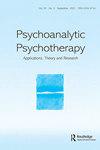Dissociative depression: a psychodynamic view
IF 1.2
Q1 PSYCHOLOGY, PSYCHOANALYSIS
引用次数: 0
Abstract
AbstractDissociative depression is a complex and chronic mood disorder characterized by a combination of persistent depressive symptoms and intermittent major depressive episodes. A key feature of dissociative depression is the existence of dissociative symptoms that are linked to prolonged stress experienced during childhood and infancy. Disturbances of sense of self and agency are core indicators of the disorder. Common symptoms include thoughts of guilt and worthlessness, difficulties with concentration and decision-making, changes in appetite and sleep, and suicidal ideation. Additionally, individuals may exhibit various expressive patterns such as borderline phenomena, psychoticism, trauma-related enactments, and attempts at control through somatization, compensatory narcissism, and obsessions. One challenge is that dissociative depression often does not respond well to biological treatments alone. Psychotherapeutic interventions that do not specifically address the dissociative aspect may also be ineffective. The required comprehensive approach involves working through layers of therapeutic reality to reverse the process that led to the status quo. An intensive psychodynamic practice with a renewed theoretical understanding (Dialectical Dynamic Therapy-DDT) is necessary to identify the leverage points that can bring about radical inner change. The aim is to alleviate the barriers that prevent individuals from realizing their full potential assigned in the beginning of life.Keywords: depressiondissociationtraumadynamicsreality AcknowledgementsThe author wish thank to Görkem Ayas, MD for their valuable comments on evolving versions of the manuscript.Disclosure statementNo potential conflict of interest was reported by the author(s).解离性抑郁:心理动力学观点
摘要解离性抑郁是一种复杂的慢性情绪障碍,其特征是持续性抑郁症状和间歇性重度抑郁发作的结合。解离性抑郁症的一个关键特征是存在与童年和婴儿期经历的长期压力有关的解离症状。自我意识和能动性障碍是该障碍的核心指标。常见的症状包括内疚和无价值的想法,注意力不集中和决策困难,食欲和睡眠变化以及自杀念头。此外,个体可能表现出不同的表达模式,如边缘现象、精神病、创伤相关行为,以及通过躯体化、补偿性自恋和强迫来控制的尝试。一个挑战是,解离性抑郁症通常对单独的生物治疗反应不佳。心理治疗干预,不具体解决分离方面也可能是无效的。所需的综合方法包括通过治疗现实的层次来扭转导致现状的过程。有了新的理论认识(辩证动力疗法- ddt),有必要进行密集的心理动力学实践,以确定能够带来根本内在变化的杠杆点。其目的是减轻阻碍个人实现其生命之初所赋予的全部潜力的障碍。关键词:抑郁解离创伤动力学现实致谢作者希望感谢Görkem Ayas, MD对手稿的改进版本的宝贵意见。披露声明作者未报告潜在的利益冲突。
本文章由计算机程序翻译,如有差异,请以英文原文为准。
求助全文
约1分钟内获得全文
求助全文
来源期刊

Psychoanalytic Psychotherapy
PSYCHOLOGY, PSYCHOANALYSIS-
CiteScore
1.30
自引率
37.50%
发文量
22
期刊介绍:
Psychoanalytic Psychotherapy publishes original contributions on the application, development and evaluation of psychoanalytic ideas and therapeutic interventions in the public health sector and other related applied settings. The Journal aims to promote theoretical and applied developments that are underpinned by a psychoanalytic understanding of the mind. Its aims are consonant with those of the Association for Psychoanalytic Psychotherapy in the NHS (APP in the NHS) in promoting applied psychoanalytic work and thinking in the health care system, across the whole age range.
 求助内容:
求助内容: 应助结果提醒方式:
应助结果提醒方式:


